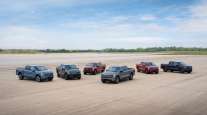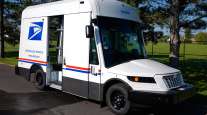Staff Reporter
Truck Makers Launch Zero-Emission Infrastructure Coalition

[Stay on top of transportation news: Get TTNews in your inbox.]
A coalition of truck manufacturers is launching a joint initiative aimed at educating and working with stakeholders to accelerate construction of charging and refueling infrastructure for medium- and heavy-duty zero-emission vehicles.
Powering America’s Commercial Transportation (PACT) — formed by Daimler Truck North America, Navistar Inc. and Volvo Group North America — is setting out to educate policymakers, regulators and other stakeholders in Washington and around the nation on the zero-emission infrastructure needs of the trucking industry.
The companies involved account for five of the top seven U.S. Class 8 brands by sales; Daimler Truck is the parent company of the Freightliner and Western Star brands; Navistar is the parent company of International Trucks; and Volvo Group North America owns the Volvo Trucks and Mack Trucks brands.
Building the infrastructure required to power or refuel zero-emission vehicles is seen as one of the stiffest impediments to expanding commercial availability of alternatives to diesel-powered trucks. Electric utilities face challenges in convincing state regulators of the need to dedicate resources to bolstering the buildout of electric infrastructure. Rapid deployment of reliable and accessible infrastructure for zero-emission trucks necessitates decisions on capital investment, electrical grid upgrades and dedicated charging equipment, said PACT.
Partnership is the new leadership to accelerate innovation. That’s why @VolvoGroupNA has partnered with @DaimlerTruckNA and @NavistarNews to form @PACTCoalition_, a coalition focused on overcoming barriers to zero-emission infrastructure. #PACTCoalition #ElectricVehicles https://t.co/1FEihjdXY3 — Volvo Group NA (@VolvoGroupNA) January 31, 2024
According to the International Council on Clean Transportation, nearly 600,000 chargers will support a projected 1.1 million class 4-8 M/HD ZEVs anticipated to be deployed by 2030, which will consume 140,000 megawatt-hours of electricity per day or the equivalent of the daily energy used by 4.9 million American homes.
“Decarbonizing the commercial transportation sector — the fleets that keep America moving — is critical to meeting our nation’s climate goals. But the transition to zero-emission vehicles is stalling without the deployment of the needed charging infrastructure,” said Daimler Truck North America CEO John O’Leary. “Through PACT, we aim to accelerate this infrastructure buildout so that fleets can adopt ZEVs at scale and we can all benefit from impactful emissions reductions as quickly as possible.”

Left to right: John O'Leary, Mathias Carlbaum and Peter Voorhoeve at the event. (Keiron Greenhalgh/Transport Topics)
At an event to launch the coalition in Washington Jan. 30, speaking alongside fellow top OEM executives, O’Leary said: “It’s not as if someone has a gun to our heads, it’s because we believe in the transition.”
“Commercial vehicle customers require fast, reliable, affordable and convenient power to effectively deploy ZEV fleets at scale,” said Mathias Carlbaum, president and CEO of Navistar. “To enable their success, we must work collaboratively across sectors to deliver an infrastructure that provides access to seamless electricity and meets the commercial transportation industry’s unique needs. PACT provides a concerted forum dedicated to making this vision a reality, truly working to accelerate the impact of sustainable mobility.”

The coalition was announced at an event Jan. 30 in Washington. (Keiron Greenhalgh/Transport Topics)
Added Volvo Group North America Chairman Stephen Roy: “The scale of infrastructure required for medium- and heavy-duty EV adoption is unprecedented. Understanding and coordination across the different stakeholders is imperative to deploy chargers quickly and cost-effectively.”
“It’s a cultural change. A step into the unknown. So, we’re doing that together,” Carlbaum said at the launch event, while adding: “The footprint of transportation in the U.S. is very favorable for electrification.”
The push for electrification and coordination “is bringing together people like us who might never have talked. Although we might have talked about one another,” O’Leary said while seated next to Carlbaum and Volvo Trucks North America President Peter Voorhoeve.
“We need everybody in this game together,” he told a packed room of executives at the National Press Club event.
“You have to evolve or you die,” O’Leary said, noting that was why partnerships between truck makers that would not have been seen five years ago were proliferating.

Michael Berube calls infrastructure the missing link in decarbonization of heavy trucks. (Keiron Greenhalgh/Transport Topics)
“Partnership is the new leadership,” Voorhoeve told Transport Topics on the sidelines of the event.
That type of partnership has backing from the federal government.
U.S. Department of Energy Deputy Assistant Secretary for Sustainable Transportation Michael Berube told executives attending the event that building out zero-emission trucking infrastructure was the missing link in decarbonization of heavy-duty freight.
The Biden administration is confident the price of zero-emission trucks will reach levels that carriers will find comparable to diesel trucks in the coming years, he said, but the big question is how quickly the supporting infrastructure evolves and expands.
“Clearly decarbonizing heavy-duty transportation is key to overall decarbonization goals. Clearly you know that. You would not be here if you did not think that,” he added.
An International Council on Clean Transportation report released Jan. 23 forecast the buildout of public medium- and heavy-duty electric charging infrastructure would be employing 15,600 people by 2032.
The three OEMs leading PACT also recruited J.B Hunt Transport Services Inc. as the coalition’s first fleet member. J.B. Hunt ranks No. 3 on the Transport Topics Top 100 list of the largest for-hire carriers in North America. It also ranks No. 5 on the TT top logistics companies list.
Among the founding members are ABB E-mobility, engineering group Burns & McDonnell, logistics real estate specialist Prologis Inc. and the British Columbia Hydro and Power Authority as founding members. Charging infrastructure developers Greenlane and Voltera also joined PACT.
PACT welcomes all stakeholders, including other OEMs, infrastructure developers, electric utilities and grid operators, its founding partners said in a statement.
More members are expected to sign up in the coming weeks, Volvo Group Vice President of Public Affairs Dawn Fenton said on the sidelines of the event.
PACT took about six months to formulate in earnest, said Fenton, with the three truck makers the charter members. Each will have a seat on the PACT board, with the remaining seats up for election.
Going forward, alongside education in Washington and for carriers, the coalition will be looking to engage in legislative cycles in different states and utility rate cases, said Fenton.
To do so, PACT’s founding members intend to hire an executive director and other staff in the coming weeks and months.
Want more news? Listen to today's daily briefing below or go here for more info:




